Tan Jiak Kim CMG (29 April 1859 - 22 October 1917) was a Peranakan merchant, political activist and philanthropist from Singapore. He co-founded the Straits Chinese British Association along with Lim Boon Keng, Seah Liang Seah and Song Ong Siang.
Tan Jiak Kim CMG (29 April 1859 - 22 October 1917) was a Peranakan merchant, political activist and philanthropist from Singapore. He co-founded the Straits Chinese British Association along with Lim Boon Keng, Seah Liang Seah and Song Ong Siang.
Tan was born on 29 April 1859 as the eldest son of merchant and philanthropist Tan Beng Swee and his wife Seet Kenh Neo, a sibling of Tan Jiak Chuan, and the grandson of businessman and philanthropist Tan Kim Seng. [1] Besides Chinese, he could also speak Malay and English. [1] Tan was introduced to the family business, Kim Seng & Co., in 1877, and became a partner with his uncle Tan Beng Gum after his father's death in 1888. [2]
Tan was elected the municipal commissioner of the central ward in 1888, generally representing the Chinese community in Singapore along with Seah Liang Seah, and resigned on 15 December 1893. [3] [4] He had resigned as his term had expired and he wished to retire from the legislative council as an unofficial member. [5] By then, he had already built himself a reputation as a philanthropist, and was popular in his position. [6] [7] However, he was the only person to be nominated as municipal commissioner in April 1894, after being nominated by Thomas Shelford and Lee Cheng Yan, and thus rejoined the legislative council as an unofficial member. [8] In 1901, he and his son went on a visit to Europe. [9] [10] Tan represented the colony at the coronation celebrations of 1911 in London along with Hugh Fort. [11]
On 3 April 1912, Tan was awarded the Order of St Michael and St George for his assistance to the legislative council, and for his philanthropy. [12] After receiving the award, he stated that he wished that more Asians would be awarded with the award. [13] [14]
Tan first announced his plans to resign from the legislative council in May 1915, as his health had begun to deteriorate. [15] [16] Tan retired from his position as an unofficial member of the legislative council in March 1916. [17] Despite his health, there were initially hopes of him recovering and returning to the legislative council. [18] Following his resignation, Lee Choon Guan proposed for a portrait of Tan to be commissioned and hung in the Victoria Memorial Hall. [19] The proposal was supported by Lim Boon Keng, and a fundraiser for Tan's portrait was soon held, with $20 being the maximum someone could donate. [20] [21]
Tan, Seah Liang Seah, Lim Boon Keng and Song Ong Siang founded the Straits Chinese British Association on 17 August 1900, which was originally headed by Lim. The organisation favoured the British, and was popular with the government of Singapore, helping represent the Peranakan community in Singapore. [22] In 1907, Lim decided to resign from his position as head of the association. He initially asked for Tan to take his place, but Tan declined the offer. [23]
In 1896, Tan introduced the "Tan Jiak Kim Scholarship" in Raffles Institution, which any male student could compete for. [24] This occurred while he was a trustee of the institution's board. [1] In 1895, following the collapse of a building, Tan donated money to victims of the collapse. [25] [26] On 14 October 1904, Tan began a fundraiser with a goal of $71,000 to fund the construction of a new school, the King Edward VII College of Medicine. [27] [28] By November 1904, he had managed to raise $37,000 for the college. [29] By 1905, $87,000 had been raised, $12,000 which had been donated by Tan. [22] Another $15,000 of the raised funds came from rubber tycoon Tan Chay Yan. [30] Tan and Seah managed to raise a further $120,000 to expand the school, and provided it with a $1,500 scholarship. [22] [1] Tan donated $37,000 to the Prince of Wales Relief Fund during World War I to aid the British in buying battle planes. [22]
Tan lived along River Valley Road in the Panglima Prang bungalow. In 1878, Tan married Ang Geok Hoe. Both of them had 2 children, a son, Tan Soo Bin, [31] and a daughter, Tan Suat Neo. [32] [33] Ang died during childbirth in 1898. [2] Tan's daughter died on 7 April 1909 from malaria, four years after her marriage. [34]
Tan later remarried to Ang's sister, Ang Geok Hean. [1] [2] In 1911, Ang began suffering from uremia and pneumonia. [35] Despite this, she decided to accompany Tan to London to represent the colony, staying at the Hilton London Metropole. [36] [37] However, she died on 4 August due to a heart failure and was buried in London. [38] Her death was announced on 11 August. [39] [40]
Following this, Tan remarried to the youngest daughter of the Ang family, Ang Geok Lan. [2] Geok Lan died on 1 October 1925. [41] [42]
Tan died on 22 October 1917 from a heart failure caused by diabetes. [43] [44] His funeral was held on 28 October. [45] [46] After the funeral, Tan was buried in his family's private cemetery along Alexandra Road in Bukit Merah. [47]
Jiak Kim Street and Jiak Kim Bridge were named after Tan after his death. [48] [49]
In 2012, Tan's fountain, which had been traded away to Penang, Malaysia after his death, was returned to Singapore. [50] [51]
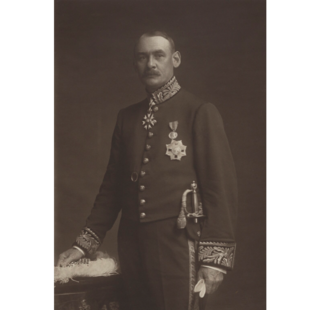
Sir Edward Lewis Brockman was a colonial administrator who served briefly as the Colonial Secretary to the Straits Settlements in 1911 and was the chief secretary to the Federated Malay States (FMS) from 1911 to 1920. He announced the establishment of the Town Planning Committee to oversee Kuala Lumpur town planning service. He was descendant of the English Brockman family. Brockman Road in Kuala Lumpur was named after him, where the former Prime Minister office was located.
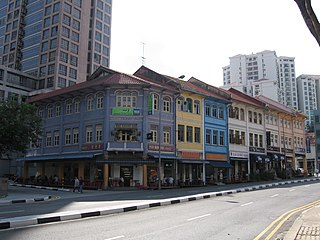
River Valley is a planning area located within the Central Area of the Central Region of Singapore. The planning area shares boundaries with Orchard in the north, Museum in the east, Tanglin in the west and Singapore River in the south.

Tan Kim Seng, was a prominent Straits-born Chinese merchant and philanthropist in Singapore in the 19th century.
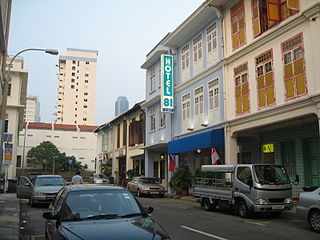
Jiak Chuan Road is a two-way road in Chinatown within the Outram Planning Area in Singapore. The road links Teck Lim Road to Keong Saik Road, it is home to several budget hotels and rows of shophouses. The place was formerly part of the Keong Saik Road red light district, home to numerous brothels.

Tan Teck Guan Building is a historic building on College Road, within the compound of Singapore General Hospital in Bukit Merah, Singapore. The building currently houses offices of the Ministry of Health.
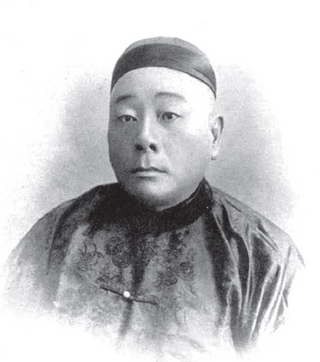
Tan Keong Saik was a Singaporean businessman who contributed much to the social and intellectual life of the Chinese community at the turn of the 19th century. He was one of the men who contributed to the setting up of the Chinese Chamber of Commerce in 1906. An advocate of education and equality of rights for women, he was also one of the first members of the Po Leung Kuk, an association looking after the interest of teenage girls and women, in Singapore.

Kapitan China Lim Ah Siang, a timber merchant and steam saw miller, the founder of "Chop Sin Moh" Johor Bahru, was the third leader of the Ngee Heng Kongsi of Johor, a legitimised secret society based in Johor Bahru. He was appointed to the position not because he was the most prominent Chinese in Johor at the time but rather, because he was not.

Sir William Thomas Taylor, was a British colonial administrator.
Sir Hayes Marriott was a British colonial administrator. Marriott joined the Straits Settlement Civil Service in 1896 as a cadet and rose to the high position of Colonial Secretary before retiring in 1928.
Wilfred Lawson Blythe was a British colonial administrator who served as the second Colonial Secretary of Singapore from 30 June 1950 to 30 July 1953.
George Hemmant was a colonial administrator. He joined the Malayan Civil Service and was a cadet on 27 November 1903. He served most of his civil service career in Federated Malay States and Straits Settlements.
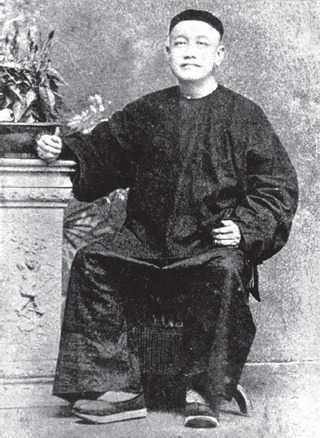
Cheang Hong Lim JP was a Chinese opium merchant and philanthropist in Singapore. He was recognised by the British colonial administration as head of the local Hokkien Chinese community.
The Chinese Commercial Bank was a Malayan bank established in Singapore in 1912. It was also the first Hokkien bank in Singapore. In 1932, the bank was merged with Ho Hong Bank and Oversea-Chinese Bank to form the Oversea-Chinese Banking Corporation.

Tay Geok Teat was a prominent Chinese merchant who was a founder the firm Geok Teat & Co., and was briefly a member of the Municipal Commission of Singapore.

Lim Koon Yang, was a Straits Chinese resident of Singapore. He was the managing clerk of the Braddell Brothers law firm from 1899-1932, and a manager of St. Andrew's School and St. Peter's Mission Church. At the time of his death, he was one of the oldest Straits Chinese people in Singapore, passing away at 73 years of age.
The 1930 Singapore Open, also known as the 1930 Singapore Badminton Championships, took place from 5 July – 27 September 1930 at the S.V.C Drill Hall in City Hall, Singapore. The ties were played over a few months with the first round ties being played on the 5th of July and the last tie was played on the 27th of September. There were no women-related competitions being held due to the lack of entries.

Chan Sze Jin CMG was a lawyer and a politician. He was a member of the Legislative Council of Singapore, and was the first lawyer in private practice to be conferred the CMG. He was also the second lawyer to be conferred the CMG, after Thomas Braddell, and the fourth Chinese to be conferred the CMG, after Hoo Ah Kay, Tan Jiak Kim and Loke Yew.
Tan Beng Wan was the co-founder of Tan Kim Tian and Son Steamship Company and a member of the Municipal Commission of Singapore.
Thomas Shelford was a merchant and a member of the Legislative Council of the Straits Settlements and the Municipal Commission of Singapore.